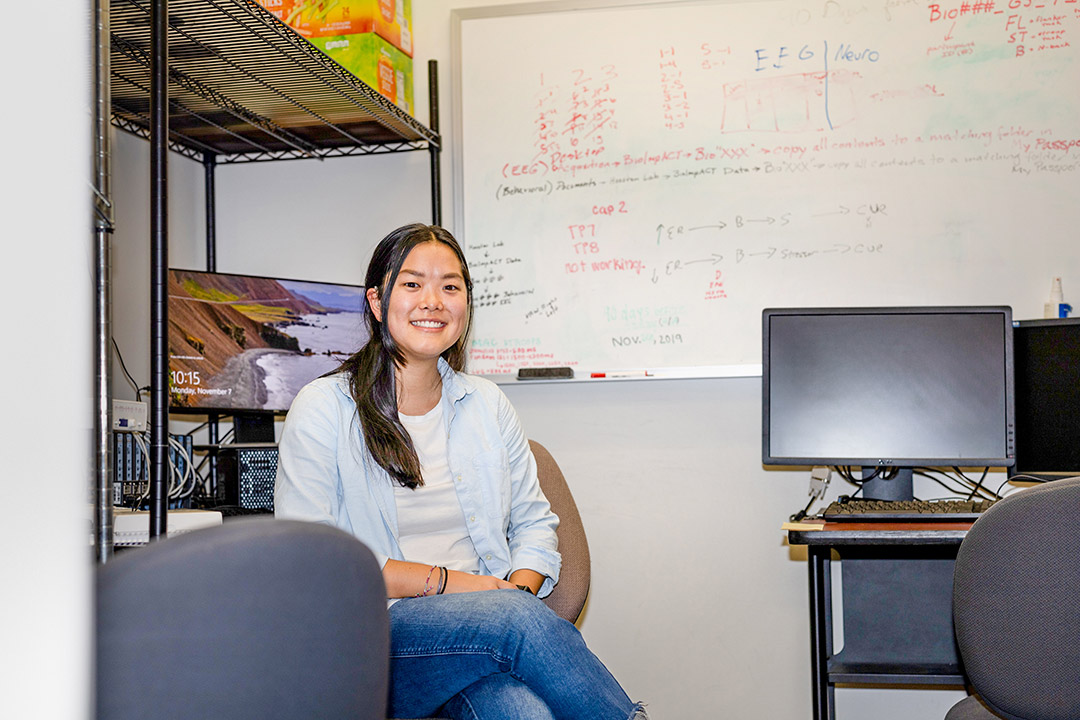Bo Allaby’s work on the resilience of the brain will lead her Ph.D. work this fall

Brianna Hill
Bo Allaby will graduate in May with her master’s degree in experimental psychology. This fall, she plans to attend Wayne State University to focus on her Ph.D. in neuropsychology to study cognition in aging populations.
As Bo Allaby nears completion of her master’s degree in experimental psychology, she is already focusing on her next step this fall—advancing her research at the doctoral level at Wayne State University in Michigan, specializing in neuropsychology and studying cognition in aging populations.
“I’ve really fallen in love with neuropsychological assessment and research,” said Allaby. “Getting my Ph.D. in clinical psychology is the next logical step—it would give me the tools to help people in a deeper, more meaningful way.”
Her passion for understanding the brain’s resilience has guided her academic path for years. Allaby’s research focuses on cognitive reserve, the brain’s ability to compensate for damage or aging. By looking at factors like education, career complexity, and leisure activities, researchers can estimate how well someone might “bounce back” from cognitive challenges like Alzheimer’s disease or brain injuries.
“It’s kind of like mental resilience,” she explained. “Why does one person with a brain injury recover faster than another? Or why does someone in their 90s still live independently while another faces early cognitive decline? I want to understand what makes the difference.”
What began as an online study using surveys to assess cognitive reserve has since evolved into a full-scale, in-person research effort in RIT’s Neurobehavioral Lab. Under the mentorship of Rebecca Houston, associate professor in the Department of Psychology, Allaby has been pioneering a project that incorporates EEG (electroencephalography) to explore whether brainwave patterns can serve as biological indicators of cognitive reserve.
Allaby, who is supported by RIT’s National Technical Institute for the Deaf and participated in the U-RISE and Rochester Bridges to the Doctorate programs for deaf aspiring scientists, has also taken the lead in training other students to run EEG sessions and administer neuropsychological assessments—a level of responsibility that reflects both her experience and her readiness for doctoral-level work.
“Through this research, I’ve learned not just how to collect and analyze data, but how to lead and collaborate. That’s going to be essential in a Ph.D. program where mentoring others and managing projects becomes part of the job.”
Her work hasn’t just sharpened her technical skills; it’s also clarified her purpose. “Even if my research helps just one person by identifying a cognitive condition early or helping them make sense of what they’re experiencing, it’s worth it.”
As Allaby looks ahead to starting her Ph.D. program in the fall, she brings with her a portfolio of research, a project that she has helped build from the ground up, and a commitment to improving lives.
“RIT has given me a foundation,” she said. “But I’m ready to take the next step—to go deeper, learn more, and hopefully make a difference in the field of neuropsychology.”









